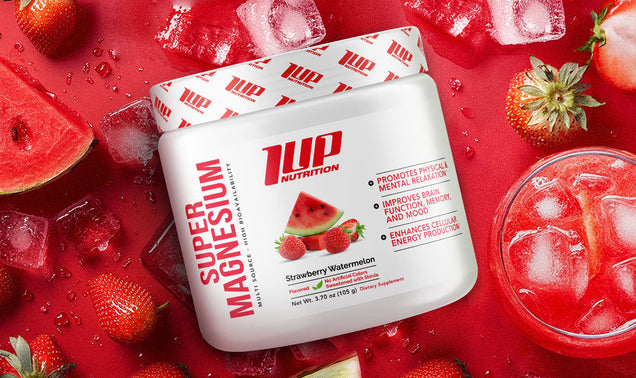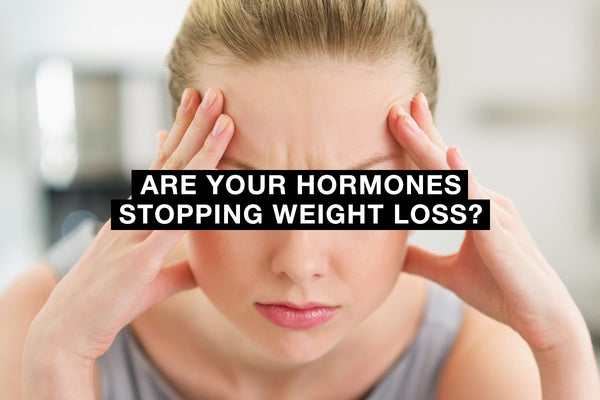Nothing is more frustrating (or un-motivating) than putting in hours of work each week in the gym and in the kitchen and not seeing results.
Even after double and triple checking your macros, you’re convinced that you’re doing by the book.
So, why aren’t you seeing results in your transformation challenge?
It might not be anything that you’re knowingly doing (or not doing for that matter).
Now, don’t get us wrong, calories in and calories out play a very significant role in the success (or failure) of your weight loss journey. But, calories are only part of the equation.
Hormones also play a big role in how efficiently your body loses weight, especially women.
Today, we look at a few of the hormones that have the biggest impact on weight loss.
Hormones and Weight Loss
#1 Cortisol
Cortisol is the body’s primary stress hormone, released whenever we perceive or encounter a threat.
In short bursts (such as intense exercise), cortisol actually is beneficial, boosting energy production, alertness, and motivation.
However, when we are chronically stressed (such as when you’re dieting for months on end), cortisol remains elevated, and when this happens, several things go “sideways”. Namely, chronically elevated cortisol levels are known to[1,2,3]:
- Reduce feelings of satiety
- Increase feelings of hunger
- Increase cravings (particularly for salty, fatty foods)
- Impair sleep
- Reduce motivation to exercise
- Lower mood
- Impair energy metabolism
- Disrupt insulin sensitivity
- Encourage fat storage
If you’re stuck in a weight loss plateau and can’t seem to figure out why, take a look at how much stress you encounter on a daily basis and how you respond to it. Some things that can help stress management include mediation, breathing drills, and limiting your exposure to known stressors.
Control stress and hormones with 5 in1 women's formula Hormone Support Plus
#2 Estrogen
As you already know, estrogen is the major female sex hormone (though men do have it in low concentrations as well).
In pre-menopausal women, estrogen is made by the ovaries and is responsible for stimulating ovulation every menstrual cycle. In post-menopausal women, ovarian-produced estrogen declines and the majority of estrogen is made by fat cells.
The reason this is important is that estrogen impacts how and where your body stores fat.
For instance in women of child-bearing age, fat tends to be stored in the lower body, creating a “pear” shape. Post-menopausal women tend to store fat around the abdomen, giving the “apple” shape.
Control Your Hormones with 5 in1 women's formula Hormone Support Plus
#3 Ghrelin
Ghrelin is the hormone most often associated with hunger.
But, that’s not all it does, it also[4]:
- Blunts insulin secretion
- Modulates gluconeogenesis/glycogenolysis (production and breakdown of glucose)
- Prevents muscle breakdown by stimulating muscle cell differentiation
- Decreases thermogenesis to regulate energy expenditure.
- Stimulates bone formation and metabolism by regulating osteoblast proliferation and differentiation
When calorie intake is low and/or when the stomach is empty, ghrelin is secreted, telling the brain that it’s time to eat.
Ghrelin concentrations are highest immediately prior to eating, and are lowest around one hour after eating.
However, individuals who carry a lot of excess body fat often present with disrupted ghrelin signaling, meaning their bodies may be telling them they need to eat, when in actuality they have had more than enough to eat.
Control Your Hunger with our top Appetite Suppressant formula
#4 Leptin
The counterpunch to ghrelin is leptin -- the satiety hormone.[5]
Leptin is released by fat cells and instructs the hypothalamus (the region of the brain that dictates hunger/satiety) when you’ve taken in enough energy and thus can stop eating.
As we mentioned directly above, overweight and obese individuals experience disrupted hunger cues and the same applies to satiety signals. This condition is called leptin resistance. Basically, your brain isn’t getting the signal that it has had enough to eat, which leads to overeating.
Moreover, leptin levels naturally decline anytime we diet, which is why you may tend to experience hunger more often, even if you have just eaten a complete meal.[6]
Maintaining a favorable body composition (reasonably low levels of body fat) can help keep proper leptin system functioning.
Additional research indicates that getting enough sleep and regular exercise may also help optimize leptin sensitivity and function.[7,8]
Can't get good sleep? Try Sleep Aid PM Weigh-loss Support
Finally, limiting the consumption of inflammatory foods (refined sugars, trans fats, etc.) and increasing intake of whole foods (fruits, veggies, lean proteins, etc.) may also help support proper leptin function.[9]
Control Your Hunger with our top Appetite Suppressant formula
#5 Insulin
Insulin is an anti-catabolic hormone that is primarily responsible for helping shuttle nutrients (carbohydrates, amino acids, and fatty acids) into cells.
However, when individuals consume an excess of carbohydrates (primarily cheap, refined carbohydrates and simple sugars) and couple it with a severe lack of physical activity, a condition known as insulin resistance develops.
Insulin resistance is a disorder in which the body’s cells don't respond well to insulin, impairing their ability to use glucose for energy.
Consequently, the pancreas continues to make more insulin to help glucose enter your cells.
When your cells can’t use glucose, it continues to circulate in the bloodstream, leading to hyperglycemia (high blood sugar), weight gain, and eventually type 2 diabetes and/or metabolic syndrome.
The best ways to prevent insulin resistance are by limiting intakes of cheap carbohydrates and refined sugar and focusing on consuming complex carbohydrates (fruits, veggies, whole grains), lean proteins, and healthy fats.
Regular physical activity is also essential as it helps use up glucose in the bloodstream, enhances the body’s ability to handle glucose, and improves insulin sensitivity.
References
- Chao AM, Jastreboff AM, White MA, Grilo CM, Sinha R. Stress, cortisol, and other appetite-related hormones: Prospective prediction of 6-month changes in food cravings and weight. Obesity (Silver Spring). 2017;25(4):713-720. doi:10.1002/oby.21790
- Stefanaki, C., Pervanidou, P., Boschiero, D. et al. Chronic stress and body composition disorders: implications for health and disease. Hormones 17, 33–43 (2018). https://doi.org/10.1007/s42000-018-0023-7
- Scott KA, Melhorn SJ, Sakai RR. Effects of Chronic Social Stress on Obesity. Curr Obes Rep. 2012;1(1):16-25. doi:10.1007/s13679-011-0006-3
- Pradhan G, Samson SL, Sun Y. Ghrelin: much more than a hunger hormone. Curr Opin Clin Nutr Metab Care. 2013;16(6):619–624. doi:10.1097/MCO.0b013e328365b9be
- Klok, M. D., Jakobsdottir, S., & Drent, M. L. (2007). The role of leptin and ghrelin in the regulation of food intake and body weight in humans: a review. Obesity Reviews : An Official Journal of the International Association for the Study of Obesity, 8(1), 21–34. https://doi.org/10.1111/j.1467-789X.2006.00270.x
- Wing, R. R., Sinha, M. K., Considine, R. V, Lang, W., & Caro, J. F. (1996). Relationship between weight loss maintenance and changes in serum leptin levels. Hormone and Metabolic Research = Hormon- Und Stoffwechselforschung = Hormones et Metabolisme, 28(12), 698–703. https://doi.org/10.1055/s-2007-979881
- Spiegel, K., Leproult, R., L’hermite-Baleriaux, M., Copinschi, G., Penev, P. D., & Van Cauter, E. (2004). Leptin levels are dependent on sleep duration: relationships with sympathovagal balance, carbohydrate regulation, cortisol, and thyrotropin. The Journal of Clinical Endocrinology and Metabolism, 89(11), 5762–5771. https://doi.org/10.1210/jc.2004-1003
- Abd El-Kader S, Gari A, Salah El-Den A. Impact of moderate versus mild aerobic exercise training on inflammatory cytokines in obese type 2 diabetic patients: a randomized clinical trial. Afr Health Sci. 2013;13(4):857–863. doi:10.4314/ahs.v13i4.1
- Ellulu MS, Khaza'ai H, Patimah I, Rahmat A, Abed Y. Effect of long chain omega-3 polyunsaturated fatty acids on inflammation and metabolic markers in hypertensive and/or diabetic obese adults: a randomized controlled trial. Food Nutr Res. 2016;60:29268. Published 2016 Jan 29. doi:10.3402/fnr.v60.29268
- Insulin resistance & prediabetes. (2018, May 22). National Institute of Diabetes and Digestive and Kidney Diseases. https://www.niddk.nih.gov/health-information/diabetes/overview/what-is-diabetes/prediabetes-insulin-resistance






